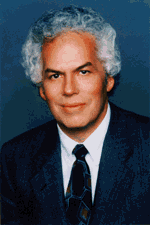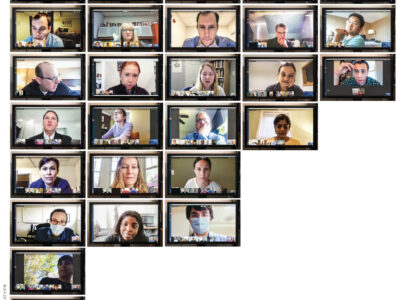
Perseverance Pays Off for Nobel Recipient.
For a scientist whose work had long been dismissed by critics, there couldn’t be much better vindication than receiving the Nobel Prize in medicine. Still, Dr. Stanley Prusiner, C’64, M’68, was notably gracious in October, after being notified that he had received that honor for a quarter-century of research linking protein particles he discovered in the brain, called prions, to mad-cow disease, Alzheimer’s disease, and other fatal, brain-ravaging illnesses.
In announcing the selection of the 55-year-old professor of neurology, biochemistry, and biophysics at the University of California at San Francisco, the Nobel award committee said it believed his findings could lead to the development of new types of treatments for these conditions.
As scientists still skeptical of his findings weighed in with their opinions, Prusiner said such doubts fuel continued research, and thus play an essential role in the scientific process. “Concepts are vindicated by the constant accrual of data and independent verification of data,” he told The New York Times. “No prize, not even a Nobel Prize, can make something true that is not true.”
The Nobel Prize for medicine is usually shared by two or three people; Prusiner is only the sixth single recipient in the last 40 years.
His research asserts that prions, though normally harmless, can become mutated through various means and then go on a cell-destroying spree throughout the brain, leaving it full of holes, much like a sponge. Skeptics concede that prions exist, but argue that they can’t cause disease because they lack the genetic material that other infectious agents possess.
Despite the skepticism, Prusiner’s work has not gone without positive notice in recent years. He received the Distinguished Alumnus Award from the Medical School in 1991 and a string of major international commendations in the years that followed, including the Albert and Mary Lasker award for basic research in 1994. The Lasker awards, in fact, have come to be known as “the American Nobel” because of the large number of recipients who have gone on to be awarded Nobel prizes.
In accepting the alumnus award, Prusiner acknowledged Dr. Britton Chance, Ch’35, Gr’40, Hon’85, the Eldridge Reeves Johnson Professor Emeritus, for the early research opportunities he gave him as a Penn medical student in his lab at the Johnson Foundation. Prusiner’s faculty advisor at the Foundation was Dr. Helen C. Davies, Gr’60, a microbiology professor at the Medical School.




